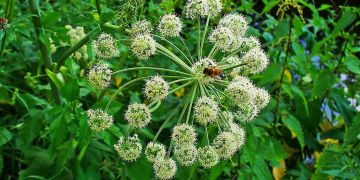Dong Quai / Angelica Benefits
Dong Quai (Angelica sinensis) is also known as Chinese Angelica and is primarily known for its uses in treating women's problems including lack of sexual desire, the symptoms of menopause, cramps and PMS. For this reason it is also commonly known as "female ginseng". It aids in increasing the effects of hormones in both men and women and is widely used as an aphrodisiac.
Medicinal uses
Dong Quai is particularly useful in helping to end hot flashes and menstrual cramps. It is also used as a liver tonic and in treating sciatica and shingles. It is one of the most widely consumed herbs in China, used as frequently as ginseng and licorice. Dong quai has been used by the Chinese for more than two thousand years, as a strengthener of the heart, lung, spleen, liver and kidney meridians and as a tonic for the blood. It is traditionally characterized as a warm atmospheric energy that promotes blood circulation.
The root has earned a reputation as the "ultimate herb" for women. It is widely used among Chinese women as a fortifying daily tonic, much as Chinese men rely on ginseng. Women in other parts of the world have also discovered this 5,000 year old tradition that naturally provides balancing and normalizing support for women's unique rhythms, cycles and body systems. It is not recommended during pregnancy or menstruation or for people taking blood thinning agents. Reports indicate that dong quai may lower blood pressure in some individuals.
Research
Dong quai contains compounds that, in laboratory tests, have demonstrated activities that may translate into reduction of pain, dilation of blood vessels and stimulation as well as relaxation of uterine muscles. Animal studies suggest that dong quai may treat abnormal heart rhythm, prevent accumulation of platelets in blood vessels (contributing to plaque formation or atherosclerosis), protect the liver, promote urination, act as a mild laxative, promote sleep, fight infection and soothe ulcers. The data consists primarily of laboratory and animal studies with a few preliminary studies in people. More studies are needed to determine the herb's safety and effectiveness in humans.
Other studies suggest that dong quai offers some value when used in conjunction with other Chinese herbs, particularly black cohosh, to treat PMS. When used in combination with ginseng (Asian ginseng) and astragalus (Astragalus membranaceus), dong quai decreased symptoms of chest pain and improved exercise tolerance in a small group of people with heart disease. A series of reports published in China indicate that the use of dong quai just following a stroke demonstrated a decrease in the amount of brain damage.
It has also been indicated for constipation, migraines, pain and liver disorders though studies are still lacking.
Always take care when taking herbs and Read Our Disclaimer
Dong Quai / Angelica Herb Notes / Side Effects
Dong quai is not recommended for children because no information relating to appropriate doses of the herb for children has been found in the literature to date. Dong quai should not be used by those who have chronic diarrhea or abdominal bloating. At particularly high doses it may increase an individual's sensitivity to sunlight and subsequently cause skin inflammation and rashes. People taking dong quai should minimize their exposure to sunlight or use sunscreen while taking the herb. It should not be taken with other medications or herbs (such as St. John's wort) that cause the same reactions.
Dong quai should not be used during pregnancy because it may affect the muscular functioning of the uterus. It should also be avoided by nursing mothers, because there is little information about its effect on the infant through breast milk.
Dong quai can increase the potency and therefore potential risks of blood-thinning medications, such as warfarin, so it should not be taken with these medicines. Although there is little research on the use of dong quai with hormone medications such as estrogens, progesterones, oral contraceptives, tamoxifen or raloxifene, health practitioners advise against using them together due to the possibility of adverse effects.
Although reported extremely rarely and not published in the scientific literature, combining dong quai with other herbs that thin the blood could possibly increase the risk of bleeding in some people. When combined with dong quai, herbs with this potential should be used only with tremendous caution and supervision. These include feverfew, garlic, ginger, ginkgo biloba, asian ginseng, licorice, chinese skullcap and turmeric.
Latin Names
Angelica sinensis, Angelica polymorpha
Common Names
Dong Quai, Chinese Angelica, female ginseng, Women's Ginseng, Danggui, Danngui, Dong Qua, Tang Kuei, Tang Kwei, Doong Quai, Qingui, Yungui, Kara Toki, Min-gui, Tan Kue Bai zhi
Pharmaceutical name
Radix Angelicae Sinensis
Properties
Mild laxative, Warming and restorative, antiseptic, diuretic, diaphoretic, expectorant, anti-spasmodic
Indicated for
PMS, menopause, cramps, increasing libido. Constipation, pain, migraines and headaches. Abnormal heart rhythm, prevention of the accumulation of platelets in blood vessels (contributing to plaque formation or atherosclerosis), protecting the liver, promoting urination, promoting sleep, fighting infection and soothing ulcers. Promoting blood circulation and lowering blood pressure.





